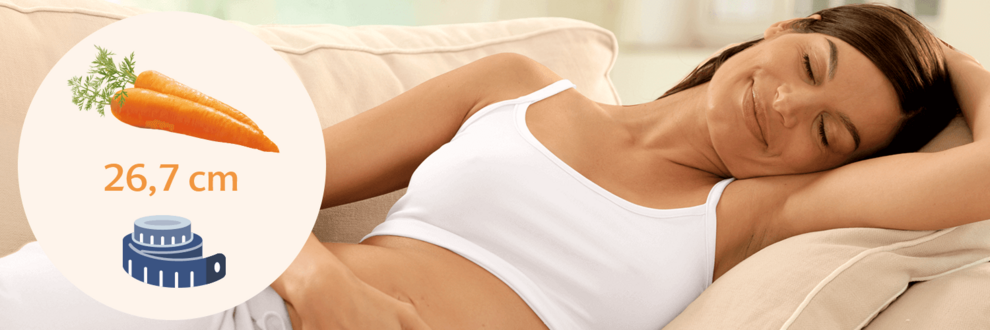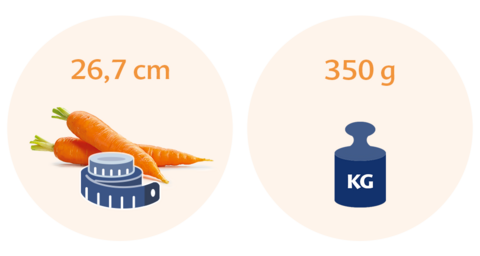Pregnancy weeks:
Week 21 of pregnancy: Your baby is developing a sleep/wake cycle

Size of your baby in week 21

Your baby is now about 27 cm long, about the size of a large carrot or asparagus.
They weigh about 350 grams (roughly the same as an aubergine), so it won’t be long until they weigh half a kilogram.
Your baby’s development
The main development in week 21 is the formation of ridges on your baby’s skull. These will close up sometime after they’re born, as their head takes on the shape it will be for the rest of their life.
Your baby is continuing to develop and refine their sleep/wake cycle, an important stage in their development.
An ultrasound scan will show what sleeping position they have adopted in the womb. You’ll be able to see if they drop their head backwards, put their hands under their chin to support their head, or draw their chin down to their chest to support their head.
In week 21, your baby’s sleeping patterns are exactly the same as they will be when they’re born and are already being influenced by noise and light. Another factor is your eating habits: the noise made by your intestine after a large meal, for instance, will keep your baby alert and moving about rather than sleeping.
Your baby’s facial expressions are also developing this week – their eyebrows have already developed, and now their eyelashes can be seen too.
Their skin firms up and the two main layers, the epidermis and the dermis, begin to form.
As you’ll probably know by week 21, your baby is very active: they’re kicking quite forcefully, turning around frequently, reaching for the umbilical cord and pulling on it, sucking on one thumb and then the other, and swallowing amniotic fluid.
They can now process the amniotic fluid they consume, as their digestive system separates the water from the other substances it contains. You can see them moving as they actively train their digestive system, though their intestine won’t be fully developed and able to digest everything they eat until they’re around 12 months old. This means that they’ll frequently suffer tummy aches and wind after they’re born.
Your baby’s taste nerves and taste buds have now developed to the extent that they can taste what you eat, as the food flavours get into the amniotic fluid they ingest. Later on, they’ll recognise these tastes when they see the food on their plate, so the more varied your diet, the better!
What it’s like for the mum-to-be in week 21
From week 21, your baby will be moving more and more, which will make your pregnancy increasingly hard work as the weeks go by. For now, there’s still no obvious sign of their activity, though you may just be able to feel them moving around. If you do, you’ll instinctively respond by communicating with your baby, which they will enjoy.
Common signs and symptoms
You’ll be getting bigger as your baby bump rounds out, and this will increase the pressure on your internal organs which have been displaced by your growing womb. This growth, the shortage of space for your other organs, and your hormones can cause a number of symptoms from time to time.
Cramp in your legs
In week 21, you begin to need more and more magnesium. One way to tell is the sudden and painful cramps you may get in your legs (in particular in your calf), which are more common at night when your muscles are resting and relaxing.
The first way to minimise these symptoms is to massage the affected area to relax your muscles again, and you should now try and eat foods rich in magnesium whenever you can.
Constipation and wind
You may have irregular bowel movements as a result of the pressure your womb is now putting on your intestine. Mostly this will cause constipation, but it’s not uncommon to experience painful wind in week 21 as well.
There are teas you can drink every day which can help with wind during pregnancy by soothing your intestine.
However, the main way to avoid constipation and wind is to increase your fluid intake and reduce your consumption of food such as cabbage, beans, garlic and onions, all of which can cause wind.
Urinary tract infections
As your pregnancy progresses, your pelvis will widen and open up, your muscles and joints will relax, and the mucous membranes in your body will become more sensitive. This makes it easier for bacteria and pathogens to get into your urethra, which may result in a bladder infection.
In week 21, your pelvis is also sensitive to cold temperatures, so make sure you keep warm and go to the toilet as often as necessary. Drinking lots of fluids is also an effective way to avoid urinary tract infections, as it helps “wash out” your urinary organs (your bladder in particular) and reduces the amount of bacteria which may have got in there.
Questions you may want to ask your doctor
Magnesium deficiency
Since the need for magnesium increases sharply in the middle of pregnancy, you should increase your intake of this trace mineral. Magnesium helps prevent intermittent muscle cramps and can “restrain” your uterus by reducing its contractions, which will reduce the risk of premature labour. If you’re not getting enough magnesium in your diet, ask your doctor to prescribe you a supplement.
What about my iron levels?
Many pregnant women feel tired, listless and weak at times – it’s a normal part of pregnancy and isn’t necessarily anything to worry about. However, it could also mean that your iron levels are too low. As iron is crucial for transporting oxygen in your blood (and therefore for your baby getting the nutrients they need), these levels need to be kept stable.
Your doctor or midwife can quickly check the levels of iron in your blood using what’s known as the Hb value, which measures the haemoglobin (Hb) content in your blood. They’ll do this at your first appointment, and then more regularly once you begin the sixth month of your pregnancy. If your levels are too low, you’ll be prescribed a suitable supplement. Iron produced artificially to be used in supplements has the disadvantage that it can cause constipation and black stools, but there are also natural iron supplements that don’t have these side effects. Talk to your doctor about it.



